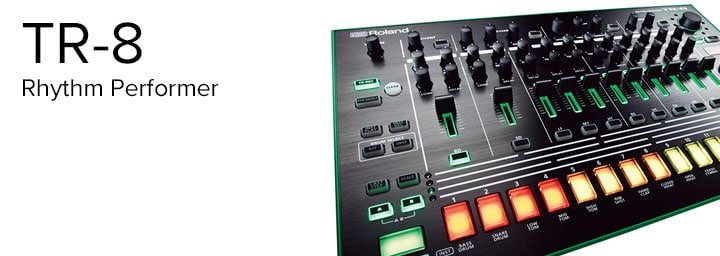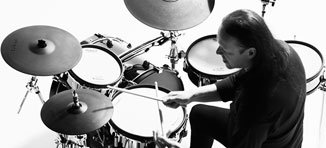DJ, producer, solo-artist and prolific remixer, Jamie xx is also one third of Mercury Music Award winners, The xx. While the band fused beats, breaks and guitars to brilliant effect, Jamie has also carved a name for himself as a ‘go to’ remixer, having crossed stems with the likes of Radiohead, Adele, and Florence and the Machine, while his debut album, In Colour, was released on 1st June 2015. With a gift for the turntables and an AIRA TR-8 recently added to his live arsenal, who better to catch up with for glimpse into the busy life of a contemporary beat-maker?
Contributed by Roland UK
When you started making music, what was your set up like?
It was tape decks and I would overdub tape deck to tape deck using records and playing guitar and piano and stuff.
So, you started collecting bits of gear from there?
I’ve never really been like a gear-head. For me, that’s usually the last part of the process. It’s always been about melody and things that make me feel something, rather than playing with something till it sounds perfect; I can do all that after I’ve come up with everything that I want to fit into a track. So I get the creative stuff out of the way before I focus more on the sounds and the gear aspect.
You’ve done some killer remixes; which are you most proud of?
Technically I guess, either the Four Tet, Seesaw remix or, I think, the remix of Bloom I did for Radiohead. That might be because they’re among the more recent remixes that I’ve done and it’s always like a progression.
Was it a challenge to put your own mark on a remix for Radiohead?
Yeah, and I did three different ones; part one, part two and part three. I put a lot of effort into them as it was a big deal to me.
Cutting back to gear; you’ve been using an AIRA TR-8 live with The xx…how have you found it?
We used it when we did the shows at the Armory. They were very intimate shows and it was the basis of this new track that we’ve been working on that still isn’t quite right. We’ve been going back and forth with it but it was a good way of working it out, to play it live.
Were there particular aspects of the machine that you’re using, because you’ve used a 909 before live?
Yeah, we still use that as well. But it was more just like, I guess, a little bit easier to manipulate live and easier to gauge certain levels whereas the 909 is hard.
The 909 can be a bit in your face, yeah! Is there any underrated act at the moment that you think deserves a shout-out??
I’m always repping Walls (*much-praised electronic duo on Kompakt Records) as I just really like what they do. It just gets me. The new album, Urals, is really good.
Have you got any good production tips for Roland users reading this interview?
Don’t think about it.
We’ve see you describing The xx’s next album as ‘freer’ sounding than the last one?
Yeah, what I meant was because we worked in a slightly different way on making my record, the songs that I collaborate on with Ollie and Romy allowed us to open up the way that we work as The xx, and that’s slightly changed how we sound on this record. It still sounds like us but it’s a little bit more open to all of our ideas at different points rather than the same process of making the song every time.
You’ve also been working on a ballet. Can you tell us about that?
It’s based on a book which is more of a piece of art called Tree of Codes. Wayne McGregor is choreographing it and Olafur Eliasson is doing the set design. We’re sort of bouncing ideas off each other and it’s just very abstract and weird and mind blowing for me to be able to do something like that. It’s making linear trains of thought in music. After focusing on trying to finish the record and making it as condensed and perfect as possible, it’s nice to suddenly have that freedom.
You’re a fan of RJD2; what does he bring to the table?
I wasn’t a fan when I was a kid. I used to like Deadringer. It’s a record that reminds me of a certain time and it was something that I hadn’t heard before. That way of making music out of other music. That was really interesting to me as I had all these records at home that I loved and I was making music so I could do both at the same time. That’s how I started making samples.
Do you still collect vinyl?
Yeah, lots. Too much!
Hypothetically, if your house was on fire and you were allowed to save one record, which would it be?
I bought this record in Japan called LA Will Make You Pay which is like a 70s private press disco thing. It was quite fine cos I’d never heard it before.
Who did that?
I can’t remember the name of the band even. In Japan, you’re flicking through shelves and shelves of things that are all incredible, all very expensive. That was one that I decided to go all out on cos it’s really good….I haven’t sampled it, it’s more just for playing out.
You also got asked to do a track for the soundtrack for the new 808 Movie that Arthur Baker co-produced?
It’s one of the tracks off my album.
I wanted to ask you about the 808 and its history; what is it about the 808 sound?
I don’t know what it is. I guess it’s because at the time it didn’t sound like anything else. It has a very specific sound that’s tough and even the 909 doesn’t sound as tough cos it’s like for house music. People are still using it in different ways. The track that’s on the 808 documentary, I slowed down an 808 kick drum to the point where it’s, like, massively bassy. It’s better than any bass I could make with any other hardware I have. It still has elements of it you can use originally even though it’s such a staple of so many studios.
And how much of Planet Rock and Afrika Bambaataa started that whole thing?
I guess that was a big part of it.
Were you conscious of that kind of music or was that more of an American thing, like when you first started getting into dance?
No, I was trying to get into everything.
So it wasn’t just limited to what was in your local music shop and what your friends were listening to, you were kind of scoping out stuff?
Yeah, I guess so, or trying to. We learnt to do that when we got signed I guess and started working with the record label, and there was just so much music out there to take in.
You worked with Drake on his album?
I just produced one track, Take Care. It was mostly them sampling me. I did a bunch of other stuff with him but it never made it onto the album.
Once you started working with Drake, did a lot of doors open in the States or had that already started happening?
There were offers and I did work with some other people but I just didn’t really like that world. There’s too many people involved in every creative decision. It’s about what makes good pop songs; there’s definitely a formula and I’m not into it.
You recently played at Sonar in Sweden and Iceland; which is your favourite festival to play at?
It depends – for fun, it’s probably like Glastonbury, Coachella or Primavera. But it’s different if I’m playing a set that I’m nervous about playing cos I want it to be really, really good – which I do feel about every set but it’s usually if I’m aware there are people I really respect there.
What about the crowds? Is there a specific crowd that goes crazy?
I think DJ-ing wise, in Tokyo last time I played which was in January they were going wild. It was great! I love playing Australia, America and I love playing Europe for a different reason cos it’s a lot more considered. The crowds really know their shit. You have to be good. I feel like you have to be on it and up to date. You have to be in the motion of playing several in a row so you’re confident about being spontaneous. In America it’s more about playing shows, cos people have come to see the guy who’s in an indie band.
So my very last question is about any other Roland gear you’ve used over the years?
I bought this Roland thing in Japan in January, like a little rhythm box, the thing with the wooden…
CR-78?
Yeah. I’ve been using that a lot, I really like that and the Space Echo has been like a staple of mine. That was the first bit of analogue equipment I ever bought.
Related Articles
HOW TO GO FROM THE BEDROOM TO THE CLUB – GETTING YOUR FIRST DJ GIGS
SBTRKT TALKS GEAR
MASSIVE ATTACK IN THE STUDIO WITH ROLAND AIRA
ROLAND ARTIST INTERVIEW – UNDERWORLD
THE ULTIMATE GUIDE TO THE AIRA TR-8 RHYTHM PERFORMER<




